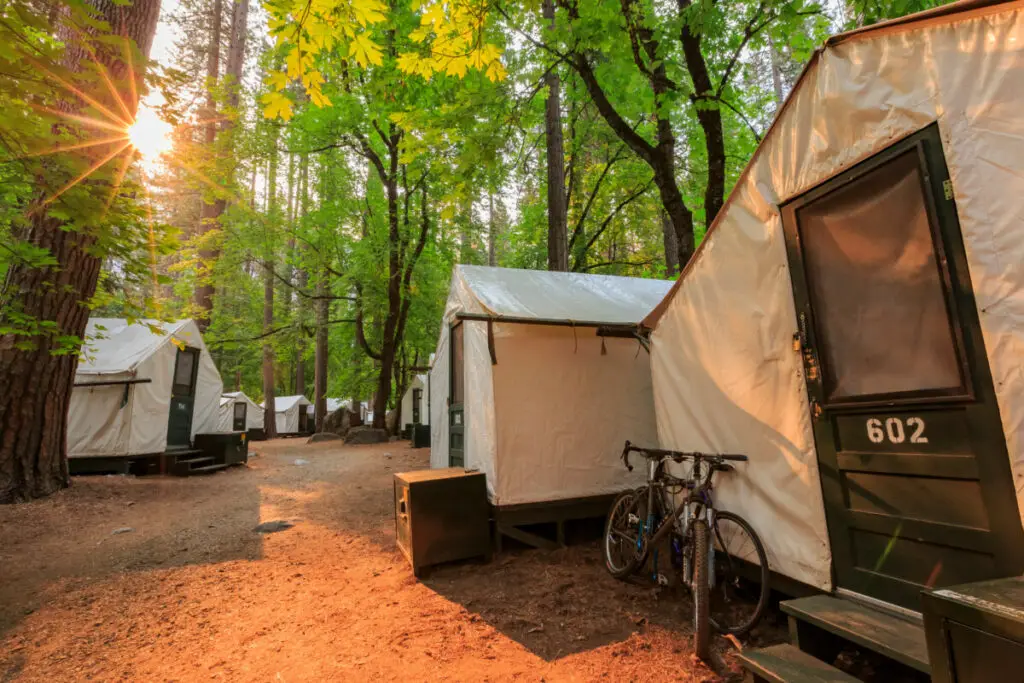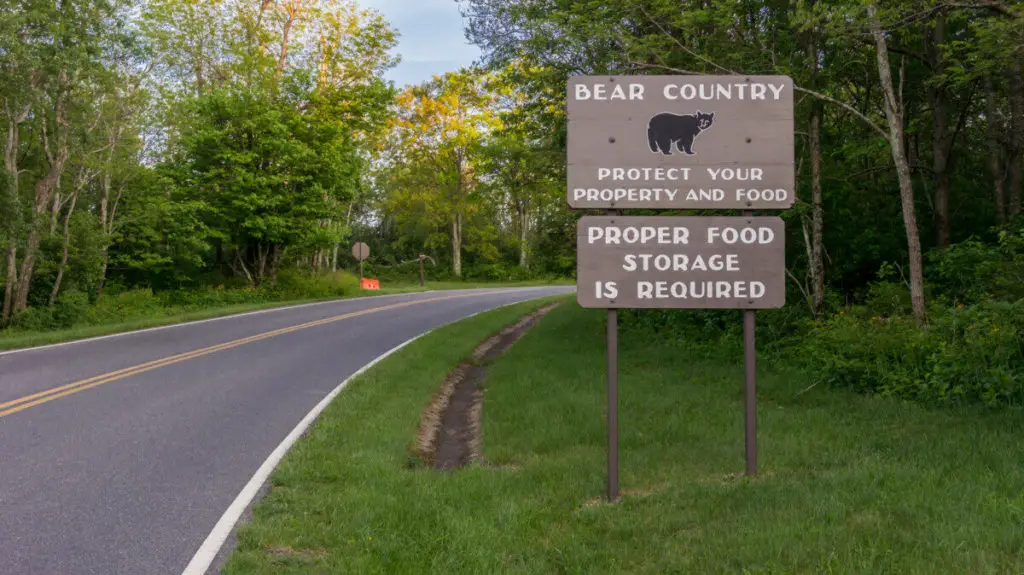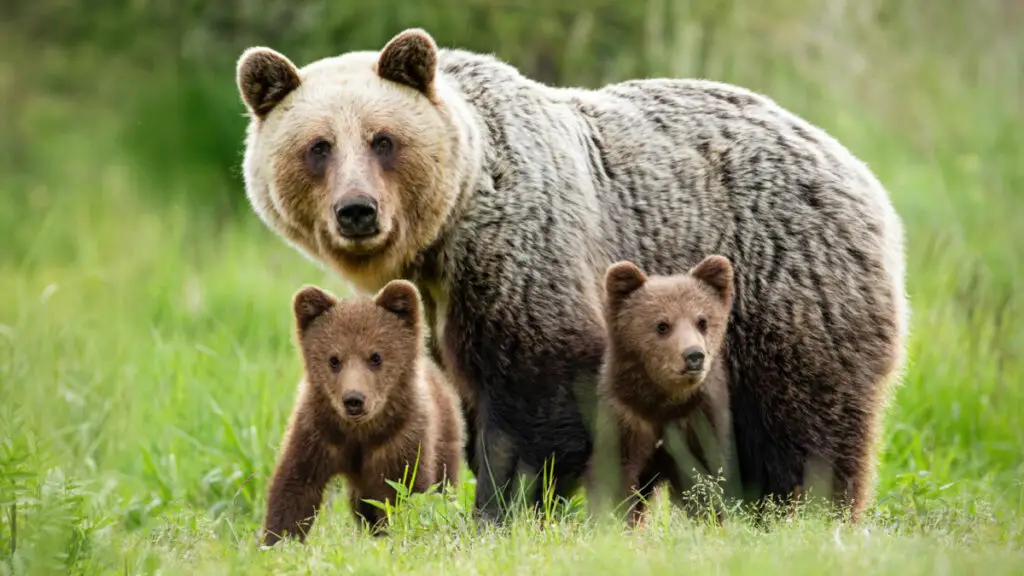
Fear of bears is one of the main things that deter people from camping, but bear attacks on humans are actually quite rare. If you know what precautions to take while you’re camping, you can be deep in bear country and still have a safe, good time.
A tent will not protect campers from a bear in the event of an attack, as tents are typically made out of fabric and other lightweight materials. To keep bears away from a campsite, store food and other scented items in secure, bear-safe containers, far away from where the tent is located.
That answer is pretty straightforward, but you may still have some qualms about camping in bear country. Here’s what you need to know about keeping your tent safe and secure.
Will a Tent Protect Me from a Bear?
The important thing to keep in mind about bears is that they don’t want to encounter you any more than you want to encounter them. Black bears, the most commonly encountered bear species in America, are especially afraid of human noises and unfamiliar contraptions. Generally, a bear will have no reason to leave its territory and approach your tent. At times, they will do so because of curiosity, but only when they smell food will bears arrive at a campsite hungry and ready for trouble.
Because tents are made of nothing by polyester and nylon, a bear will have no trouble using its knife-like claws to slice through yours. The only reason it would do so, unprovoked, is if it smelled something inside the tent that seemed appealing or edible. Humans do not naturally smell attractive to bears because bears do not normally encounter humans in their natural habitat. Human food, however, is very appealing to bears.
To stay safe in your tent, remove all scented or aromatic objects from the premises. If you cooked dinner before going to bed, change into clothes that do not smell like any of the food. If you shower or bathe while camping, use odorless soap and avoid personal care products that smell like fruit. Above all, never keep food in your tent; bears walking by late at night are bound to smell it and come sniffing to investigate. If a bear is hungry, a tent will do little to deter it from getting what it wants.
Is it Safe to Camp in Bear Country?

It is safe to camp in bear country. National Park officials and camping site managers take care to ensure that trash cans and food bins are bear-proof and that bears do not get the chance to taste human food. Once a bear has tasted human food, it becomes far more dangerous than it was before. This is because human food is much saltier and sweeter than anything else a bear will taste in the wild, and from that point on, the bear will crave more. Bears who crave human food will do whatever it takes to get it.
If national park services find out that a particular bear has gotten into human camping food or trash, they will track the bear and put it down. This prevents the bear from continuing to hunt for human food, as well as from teaching its young where to find food among humans. Obviously, park rangers do not want to have to hunt down and kill native bears, so it is important to help prevent bears from being exposed to human food and becoming a threat to other campers.
“The most important thing to remember when camping in bear country is, never allow bears to obtain your food, garbage, or other attractants. Bears that learn to obtain food in campgrounds often become increasingly bold and aggressive in their efforts to obtain these foods.”
Grizzly & Wolf Discovery Center
Are there Bear-Proof Tents?
There are specially designed tents that can withstand heavy weather and even some attacks from wild animals, but they are very expensive. At that point, you’re better off investing in a camping trailer or a truck extension. Vehicles and RV campers are always safer from bears than tents since you can lock the doors and the material is far more sturdy.
Never sleep in your sleeping bag out in the open while in bear country. While it may seem tempting to sleep under the stars or enjoy a night in the hammock, most reported bear attacks involve campers who were sleeping out in the open.
To make a regular tent more bear-proof, eliminate anything and everything that might make a bear interested in your tent in the first place. Store food in elevated, secure containers like coolers or metal boxes, far away from where you are sleeping; the same goes for all personal care products and other items that might be scented.
Here are the main things that have proven to attract the hunger or curiosity of bears; either don’t bring them with you while you’re camping or figure out a way to securely store them far away from your tent:
- All human food
- Pet food and livestock feed
- Garbage
- Cooking pots and utensils
- Cooking oils
- Fuel for stoves and lanterns
- Unopened canned beverages
- Cosmetics, insect repellents, lotions, toothpaste
- Birdseed and hummingbird feeders
You can also keep a flashlight and bear spray with you in the tent for protection. Bears are scared by sudden lights that flash on in the middle of the night, so turning on your flashlight might be enough to startle the bear and send it away. Bear spray will temporarily stun the bear but not harm it long-term; it’s simply a way to buy you time in the rare event of an attack.
Another thing to keep in mind is the location of your tent. Never set up a tent near trails, berry patches, animal carcasses, or a sign with the bear symbol. These areas are known to have significantly higher bear traffic, and it’s not worth the risk.
Should I Put Bear Spray on My Tent?
You should not put bear spray on your tent. Bear spray is an extremely strong version of pepper spray; it contains capsicum, which is what makes peppers so spicy and what makes the spray so irritating to the eyes, nose, mouth, and throat. Spraying it on your tent will not keep bears away in the way that bug spray keeps bugs away; in fact, spraying concentrated capsicum on your living area is more likely to cause harm and irritation to you and your fellow campers than anything else. Save bear spray for the rare and improbable event of an attack, and only spray it if a bear is physically and aggressively approaching.
Bear spray is designed to spray up to 30 feet away and has proven to be incredibly useful in deterring bears. It does not harm the bear, it just temporarily disables it so that you have time to get away. In fact, statistics show that campers who use bear spray are about 50% less likely to be hurt than campers who use guns to keep bears away
Firearms startle bears and they will most likely attack the person shooting out of fear and anger. Bear spray immediately causes an unpleasant sensation, much like a skunk or a poisonous animal would if a bear encountered it in the wild. In this case, the bear will most likely leave and you’ll have time to get away.
So, while it is not a good idea to use bear spray directly on your tent, it is a good idea to purchase some spray and have it with you while traveling in bear country. Before purchasing a can of bear spray, read the manufacturing label and be sure to confirm that the bottle is at least 8 ounces, EPA registered and certified, and can produce an expanding cloud of spray that reaches up to 30 feet away. Bear spray is absolutely not intended for use on other people; follow the instructions closely, and only use it on bears if completely necessary.
What to Do if a Bear is Near Your Tent
If you spot a bear by your tent, speak to it in a loud, firm voice. Let it know that you are human. Most bears are afraid of humans and the sound of your voice will scare them away. If you notice the bear but it does not see you, back away slowly until you are as far away as possible.
Quietly removing yourself from the area is the safest way to avoid a negative, potentially harmful interaction. Do not approach the bear to take a picture or satiate your curiosity, and most of all, do not turn your back on it. Running or walking away from the bear will likely cause it to chase you.
“If you do encounter a bear, don’t run! If you run, you may very well trigger the bear’s predatory instincts and if it wants to catch you, it will. A bear can sprint at 35 mph and cover 100 yards in about 7 seconds. Stop and calmly assess the situation.”
Grizzly & Wolf Discovery Center
If you hear a bear sniffing outside of your tent at night, keep quiet and still. If you’ve removed all food items (and other scented items) from the area, the bear is most likely just curious and will eventually go away. On the extremely off-chance that the bear attacks your tent, the National Park Service says you should fight back. Bears that are physically attacking humans are most likely very hungry and view them as prey.
Offensive actions, rather than defensive actions like playing dead, will let the bear know that you are not easy prey and that you intend to fight back. Use loud noises, tools, bear spray, or any other weapon or deterrent you can find. Because apex predators, like bears, are not accustomed to being significantly challenged by their prey, they want to avoid injury at all costs. It is not worth pursuing prey that will cause physical harm, so the bear will leave and look elsewhere for an easier target.
Encountering a Grizzly vs a Black Bear

Like most other wild animals, bears are scared of anything unfamiliar or anything they don’t understand. Black bears and grizzly bears react differently to things that scare or irritate them, so it’s important to know the differences between the two, and how you should respond during an encounter.
Curious bears will not make any noise and their ears will be pointed up in a calm, non-agitated manner. If a bear is exploring your campsite, either back away and leave it alone until it departs, or scare it away by making yourself appear bigger and making loud noises. If a bear approaches you aggressively, the best course of action depends on whether it is a grizzly bear or a black bear.
Grizzly Bears
Grizzly bears are primarily found in Alaska and Canada, but can also be encountered in Wyoming, Montana, Idaho, and Washington. They are big, brown, have small round ears, and have a prominent shoulder hump.
If you encounter a grizzly bear, keep your distance. It may stand on its hind legs, but this does not mean it is about to attack. Bears stand on their hind legs when they are assessing a situation.
To help the bear know that you are not a threat, speak to it calmly, back up slowly, and do not make eye contact. If a grizzly makes huffing noises, slaps the ground with its front paws, or bounds toward you, it is perceiving you as a threat and trying to scare you away. In this case, stand your ground and continue to talk to it calmly.
If a grizzly bear goes silent, lowers its head, flattens its ears, and begins to charge at you, use your bear spray as it approaches. Don’t panic; only spray when it is within 30 feet and spray at an angle that will not go over the bear’s head.
If all else fails, play dead. Lie down on your stomach, put your hand on your neck, and spread your elbows and knees. Leave your backpack on, as a protective layer between you and the bear. If the bear tries to turn you over, continue rolling until you are face down again. You can also try sitting in a tight, cannonball position. In either of these positions, the bear may bite you, but it will ultimately decide that you are not a threat and will probably leave.
Black Bears
Black bears are smaller, darker, have no shoulder hump, and are far more common throughout North America. Though they are generally much less aggressive than grizzlies, if a black bear does attack a human it is probably doing so with predatory intentions. If a black bear is heading your way and appears aggressive, make yourself look as big and scary as possible. Raise your arms, shout, bang pots and pans, throw rocks, hit it with a big stick, whatever it takes. If you’re in your tent or near the camp, secure any food that is exposed to make sure the bear cannot get to it.
If a black bear attacks, do not play dead. It will see you as easy prey and will continue to attack. Unlike grizzlies, which are territorial and motivated by eliminating threats, black bears only attack humans if they are hungry. Fight back, and let the bear know that you are not worth messing with.
And most importantly: Never, ever, ever approach bear cubs. Even if you see them somewhere on their own, and even if they’re irresistibly cute, stay away. Even if you cannot see her, there is always a mother bear nearby, and mother bears are the last kind of bear you want to aggravate. They are easily the most aggressive and defensive, and they will kill anything they perceive as a threat to their cubs.

